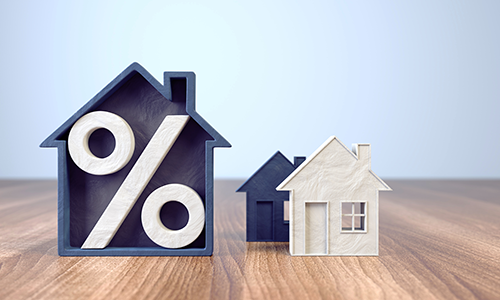
On Thursday 11 May 2023, the Bank of England raised interest rates (the base rate) by 0.25% to 4.50%.* Don’t panic; this latest interest rate rise is relatively small and will not impact your mortgage rate significantly, or, in some cases, not at all. With this latest increase in the base rate being the twelfth consecutive rise, you could be forgiven for thinking; not again! However, with inflation finally falling, interest rates appear to be peaking.
Why another increase in the base rate? The Bank of England raises the base interest rate to curb inflation. Inflation is the increase in the cost of goods and services, or the cost of living. The idea is an increase in interest rates means more people will save instead of spend, which reduces inflation as there is less demand for goods and services. Currently, at 8.7%, the rate of inflation is still way short of the Bank of England’s 2% target.* The inflation rate remained high at 10.1% up to March.** So the good news is it’s coming down, just not as quickly as first thought.
Why is inflation coming down? More positive news is, the Bank of England expects inflation to fall to 5% by the end of this year and reach its 2% target by the end of next year.* There are a number of reasons for this. Wholesale energy prices have fallen, the price of imported goods is expected to fall as production issues are resolved, and less demand for goods and services in the UK.
What does all this mean for your mortgage?
- Mortgage rates: If you are taking out a mortgage, the increase in the cost of your mortgage, if the mortgage interest rate increased from 4.44% to 4.52% for an average priced house, in the UK, on a five-year fixed rate, would mean an increase of £14 per month.** Mortgage rates hovered around this level from late May to early June, but there may be another small increase in anticipation of a further base rate increase toward the end of June.
- Fixed-rate deal: If you are on a fixed-rate deal your interest rate will not go up until the end of your deal. If you are thinking about buying, a good move is to port your mortgage allowing you to move home with your existing mortgage.
- First-time buyer mortgages: This sector of the market is doing well. Demand for first-time buyer homes is very strong and because of this lender mortgage interest rates are some of the most competitive in this sector. And with the return of 100% mortgages and the government’s Mortgage Guarantee Scheme still in place, it’s little wonder demand is good.
- Tracker mortgages: The cost of these types of mortgages are often greater than fixed-rate mortgages. Right now, variable interest rate mortgages are considerably higher in the short term and any increases in the base rate will increase your variable interest rate.
A huge choice of mortgages According to Moneyfacts, there were 5,385 residential mortgage deals on the market at the end of May.*** That’s more than double the amount available toward the end of last year. This figure may reduce a little if there is another increase in the base rate in June to a figure of 5,000.*** This is a small reduction and represents a tweak in a stable market and not a significant change.
Conclusion The property market is very resilient with prices and demand far exceeding expectations. Interest rates are peaking and while there is a chance of another increase in interest rates in the short-term, they are expected to come down as inflation lowers. Any increases are tiny adjustments and there is a huge variety of innovative mortgage products on the market. This helps you to offset the increase in interest rates as property prices will likely increase as interest rates fall. So, waiting to make your move may not necessarily save you any money.
Have you got your heart set on moving now?
Browse our website or get in touch with our helpful team today.
Bank of England*
Rightmove**
Moneyfacts***